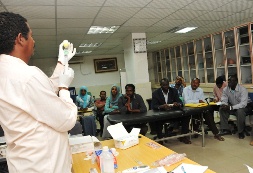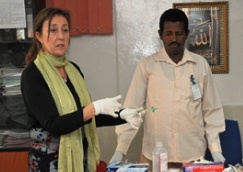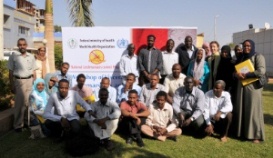 A training programme on visceral leishmaniasis management with special focus on AmBisome storage, transport, preparation and administration of the drug, as well as Pharmacovigilance was conducted from 10 to 12 December 2012 in Khartoum, Sudan.
A training programme on visceral leishmaniasis management with special focus on AmBisome storage, transport, preparation and administration of the drug, as well as Pharmacovigilance was conducted from 10 to 12 December 2012 in Khartoum, Sudan.
The training for health workers from endemic treatment sites, including non-government organizations particularly MSF and other institutions was organized by the Ministry of Health with support from the World Health Organization. Two participants from South Sudan’s leishmaniasis national control program were as well invited.
Participation and involvement of 25 health workers was high, including program coordinators from national control program and States. The drug will arrive soon to the country after readiness of the treatment sites is assured.
Leishmaniasis is a parasitic disease, transmitted by sandflies and extended in nearly 100 countries in the world. There are mainly two forms of the disease, cutaneous leishmaniasis, highly stigmatizing and causing disfiguration, and visceral leishmaniasis, which is fatal without appropriate treatment.
 Leishmaniasis is one of the most neglected tropical diseases that recently deserved the attention of the World Health Assembly in 2007, when Member States in which leishmaniasis is a substantial public health problem were called to undertake actions to deal with the major factors underlying the failure to control the disease.
Leishmaniasis is one of the most neglected tropical diseases that recently deserved the attention of the World Health Assembly in 2007, when Member States in which leishmaniasis is a substantial public health problem were called to undertake actions to deal with the major factors underlying the failure to control the disease.
Sudan and South Sudan are among the five most endemic countries in the world for visceral leishmaniasis accounting for around 15,000 and 10,000 cases per year, respectively. In Sudan, treatment is provided by Ministry of Health with the support of WHO, and NGOs. Frequent outbreaks occur associated with malnutrition and displaced populations in eight endemic States in remote areas which access to treatment is not always achieved.
The milestone of prevention and control of the disease in our context is early diagnosis and effective treatment, and vector control strategies are difficult to address due to the complexity and variety of transmission cycles, environmental factors, population behavior and habits.
 Recently, the WHO has finalized more than five years negotiations with one of the main companies manufacturing liposomal amphotericin B (AmBisome®) one of the safest but most expensive drugs used for the treatment. A single treatment cost was around 3,000 US$ before WHO negotiated price and the current cost for developing countries after negotiation is around 300 US$. A donation of 445,000 vials from WHO to eligible countries (Sudan, South Sudan, Ethiopia and Bangladesh) is secured for five years for the treatment of around 50,000 most severe patients who are candidates for this drug.
Recently, the WHO has finalized more than five years negotiations with one of the main companies manufacturing liposomal amphotericin B (AmBisome®) one of the safest but most expensive drugs used for the treatment. A single treatment cost was around 3,000 US$ before WHO negotiated price and the current cost for developing countries after negotiation is around 300 US$. A donation of 445,000 vials from WHO to eligible countries (Sudan, South Sudan, Ethiopia and Bangladesh) is secured for five years for the treatment of around 50,000 most severe patients who are candidates for this drug.
AmBisome® will ensure treatment of severe patients in the most remote sites and hopefully increasing access to treatment and decreasing mortality of these patients.





